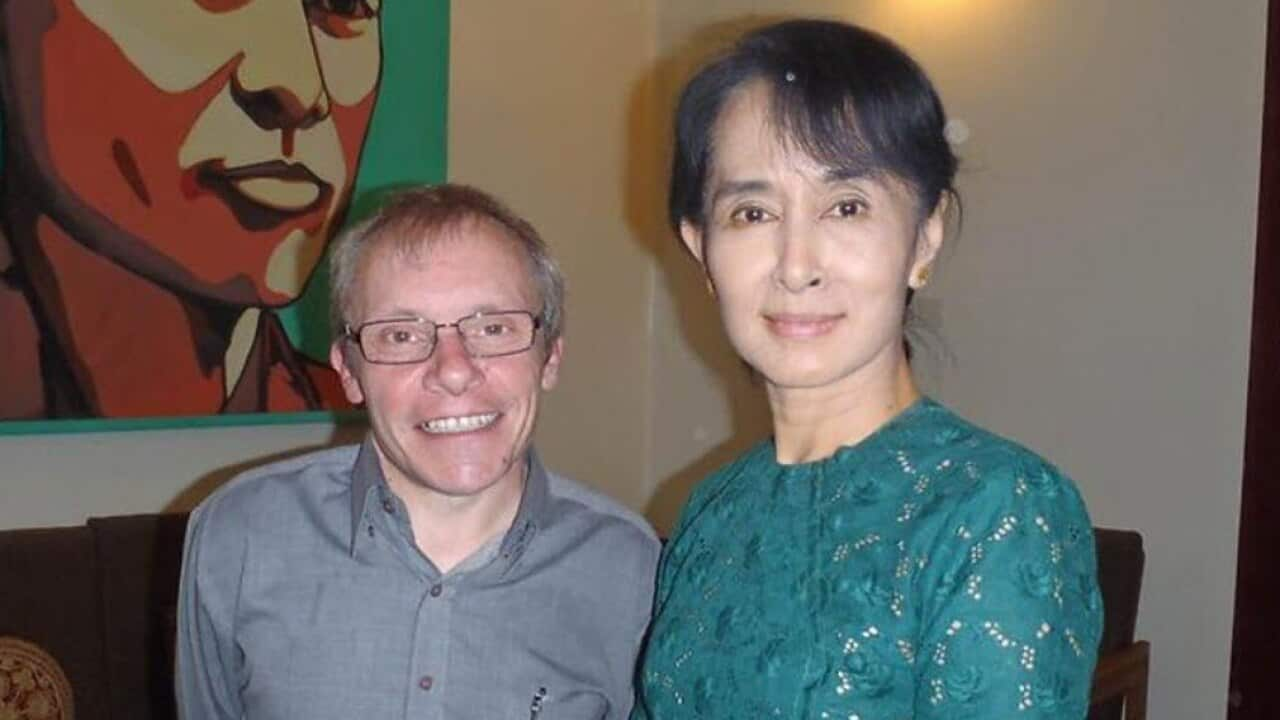Myanmar's deposed leader Aung San Suu Kyi has been charged along with four of her allies with violating the country's colonial-era official secrets act, her chief lawyer said on Thursday.
Ms Suu Kyi, three of her deposed cabinet ministers and her detained Australian economic adviser, Sean Turnell, were charged a week ago in a Yangon court, Khin Maung Zaw told Reuters by phone, adding he learned of the new charge two days ago.
Myanmar has been rocked by protests since the army overthrew Ms Suu Kyi's elected government on 1 February citing unsubstantiated claims of fraud in a November election that her party swept.
In a new measure to stifle communication about the turmoil, the junta ordered internet service providers to shut down wireless broadband services until further notice, several telecoms sources said.
Ms Suu Kyi and other members of her National League for Democracy (NLD) have been detained since the coup and the junta had earlier accused her of several minor offences including illegally importing six handheld radios and breaching coronavirus protocols.
A conviction under the law can carry a prison sentence of up to 14 years.
A spokesman for the junta did not answer telephone calls seeking comment.
Australian adviser Dr Turnell was taken into custody in the country's capital on 6 February, in what was the first known arrest of a foreign national as part of the coup.
A friend of his, Susan Harris Rimmer, previously told SBS News he is “nicest human you will ever meet”.
“He’s just a lovely man, there is no possible reason why he should be detained. He would never do anything wrong in any circumstance,” Professor Rimmer said in February.
Ms Suu Kyi, who is 75 and won the Nobel Peace Prize in 1991 for her efforts to bring democracy to Myanmar, appeared via video link for a hearing in connection with the earlier charges on Thursday.
Another of her lawyers, Min Min Soe, said she appeared to be in good health.
"Amay Su and President U Win Myint are in good health," the lawyer said, referring to Ms Suu Kyi by an affectionate term for mother.
The president, a Ms Suu Kyi ally, was also deposed and detained in the coup.
He too faces various charges.
Their lawyers have said the charges against both of them were trumped up.
At least 538 civilians have been killed in protests against the coup, 141 of them on Saturday, the bloodiest day of the unrest, according to the Assistance Association for Political Prisoners (AAPP) activist group.
Protesters were back out in several places on Thursday and two more people were killed, according to media reports, as activists burned copies of a military-framed constitution and called for unity among all those opposed to army rule.
One person was killed and five wounded when the security forces fired in the central town of Monywa, the Monywa Gazette reported.
Security forces also opened fire in the second largest city of Mandalay killing one person, media reported. Shots rang out and black smoke drifted over Myanmar's ancient royal capital.
Shots rang out and black smoke drifted over Myanmar's ancient royal capital.

Demonstrators shout slogans during a protest against the Myanmar military coup in Mandalay on 1 April. Source: AAP
Police and a spokesman for the military did not answer calls seeking comment.
The suspension of wireless internet connections is likely to cripple communications about the protests in a country where very people few have access to fixed line connections.
The coup has also triggered new clashes in Myanmar's old wars.
At least 20 soldiers were killed and four military trucks destroyed in clashes with the Kachin Independence Army (KIA), one of Myanmar's most powerful rebel groups, DVB news reported.
Reuters could not immediately verify the reports and a junta spokesman did not answers calls seeking comment on the clash.
Myanmar military aircraft have started bombing positions of another group, the Karen National Union (KNU), for the first time in more than 20 years and thousands of villagers have fled from their homes, many into Thailand.
The army takeover has led to calls for a united opposition among city-based democracy campaigners and ethnic minority forces battling in frontier regions.
Ousted members of parliament, mostly from Ms Suu Kyi's party, have vowed to set up a federal democracy in a bid to address a long-standing demand from minority groups for autonomy.
They also announced the scrapping of the 2008 constitution drawn up by the military that enshrines its control over politics.
The military has long rejected federalism, seeing itself as the central power able to hold the fractious country together.
With additional reporting by Reuters, SBS News.













